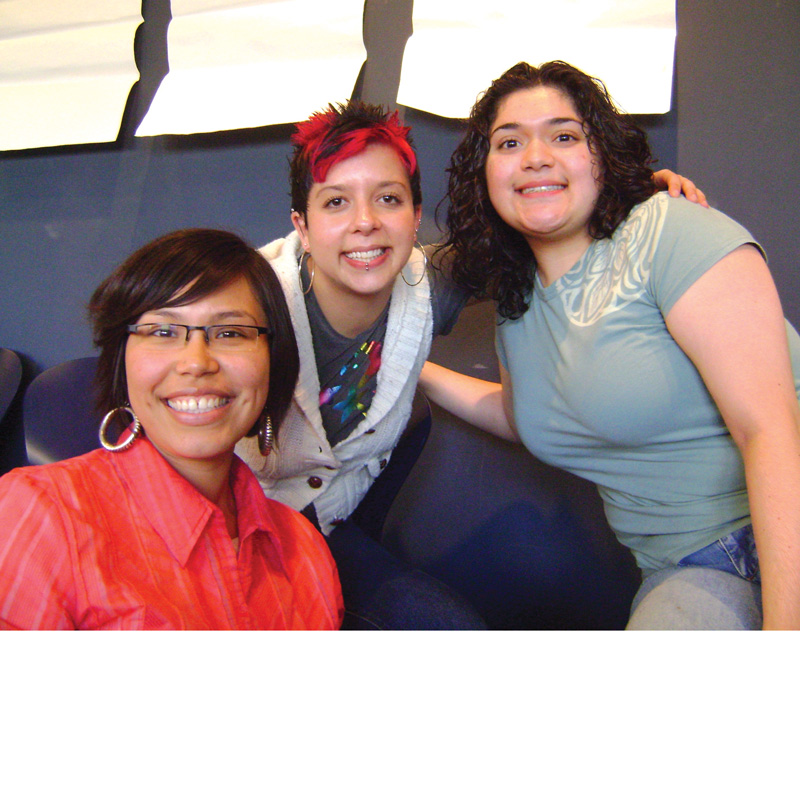Soon to enter its 13th year, Dyke March Chicago is, for many lesbians and transgender people, an alternative to Pride Parade. Historically, the March has remained on the city’s North side. This year, it’ll be in Pilsen, home to a predominantly Latina/o community. In the last few weeks, organizers began hearing complaints about the change in venue, and decided to hold a town-hall meeting. According to Nicole Perez, a member of the Dyke March organizing committee, the event was held to dispel misinformation and stereotypes about the logistics of the March and the neighborhood.

Seventy people, ranging widely in age and ethnicity, attended the June 16 event at the Center on Halsted, 3656 N. Halsted. Perez, along with Jacky Luna and Rosa Yadira Ortiz, spoke about the reasons for the shift; Kate Eubank and Sabrina Hampton moderated a discussion.
Perez spoke about the early vision of Dyke March Chicago, originally organized as “a direct action demonstration.” But, according to her, “over the last few years, Dyke March had become more of a parade and less of a demonstration.” Perez noted that Dyke March Chicago had organized several forums across the city, and that the decision to move to Pilsen came from the community. She said that concerns about the change were voiced in terms of queer safety in Pilsen, which ignored the fact that many people of color had not felt safe during North Side marches. Luna said the change would show that “we are everywhere.”
Ortiz pointed out that the Annual Queer Prom is held in Pilsen and that Pilsen would be one of many future different locations for the March in upcoming years. Audience members were asked why Dyke March Chicago mattered to them and what they felt about the change. One woman responded that it was “the only space that I actually respect in the context of the whole Pride melodrama.”
Another participant said she was excited about the march “going back to its original purpose,” and yet another said “I don’t identify with the rainbow flag or Pride… My fear about Dyke March is that it would only be a lesbian version of Pride. Moving to Pilsen has the intention and politics we all care about.” The issue of safety in Pilsen was raised again when a woman said that she was moving to the West Side: “I might get killed in Humboldt Park, so it would be good to see queer activity there.”
Ann Russo addressed this comment by talking about the difficulties of maintaining community “when we are who we are” and that she was “disturbed by the conversation about Humboldt Park because that”s what’s been lodged against Pilsen, especially as white folks are talking about different neighborhoods as more dangerous than others…How can we create a conversation among us?”
Russo was among several people at the town-hall meeting who identified themselves as white allies supporting the change in venue. They distributed a flyer in support of the move, and addressed the discomfort apparently articulated by those in opposition: “Experiencing discomfort is an integral part of building alliances and coalitions across divided and segregated communities.”
Many participants said that the move would increase queer visibility across the city. Others felt there was a misperception about Andersonville as the gay capital of the city and that keeping the march on the North Side “insulates the neighborhood from confronting the community’s exclusions.”
Cindy Ibarra, also an organizer, spoke to Windy City Timesabout the racial and ethnic issues around the march: “We have to remember our history and people like Silvia Rivera, a Puerto Rican transgender person.” Ibarra addressed gentrification and development and the supposed potential for violence against queers in Pilsen, while “ignoring the root causes of violence and poverty. Dyke March is committed to expanding [a conversation on] those issues.” Ibarra echoed comments in the room when she said that the current debate was “a reality check about racism in the LGBTQ community, as well as class privilege and the way in which Chicago views its many communities of color.”
There were questions about police presence at the march. In response to a concern about trans demonstrators who are often jailed in cells meant for the opposite sex, Bill Greaves said that city law demanded that “you are treated as you present yourself” and according to identification papers, which could include a library card.
There have been rumors about a counter-march in Andersonville by those opposing the move. Perez said that they had not heard any details. Organizers will be present in Andersonville June 28 to engage with any splinter groups. Arlene Welty, also a white ally, will be among those leading a bike contingent from Andersonville to Pilsen: “It’ll help ease the transition.”
Dyke March Chicago begins Sat., June 28 [2008], 1 p.m. at 1800 S. Halsted, with the step-off at 2:30 p.m. Attendees will march down 18th Street to rally at Harrison Park, 1824 S. Wood. E-mail dykemarchchicago@gmail.com or visit www.myspace.com/dykemarchchicago.